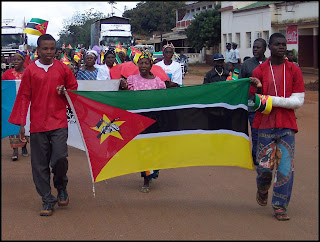Dear friends of “We Love Mozambique”:
We want to say thanks for all who showed your appreciation and affection regarding
the dinner show on March 16.
You can see the video of:
"We Love Mozambique Dinner Show":
We started the
countdown for our trip to Mozambique. We’ll go on July 3rd, as a
team of 5. We ask for your prayers, that we may be a blessing to the local
people: Adaia Elizabeth Henriquez and Jessica Maldonado from Brooklyn; Erwin
Izeppi, Estela Izeppi and myself, Daniel Martin from Passaic. Juan Carlos
Fioretti from Argentina is joining us there and is planning to stay for 3
months.
We will be
visiting several churches and connecting with several projects. Among them are:
• Medicine Development
Project, ANAMED.
• The Infants
Nutrition Project.
• A non for profit
association for orphans.
• A preschool,
ESPANOR.
• Translation of
the Bible in the Takuani language.
• Production and promotion
of music and videos.
• Bibles for
Mozambique.
• Jesus Film.
• Leadership
Training Program SEAN (Study by Extension for All Nations).
We will be holding
conferences on family, children, marriage, and leadership in various
communities.
We will be taking
glasses, musical instruments, speakers, laptops, baby clothes, projectors and DVD
players for the Jesus film. Do not start gathering anything without notifying
us, because we have limited space and want to optimize the available space.
We need your money
donation to buy:
• 2 motorcycles
($ 1,556 each) for pastors Massamba and Goncalves. Both have great
responsibilities and are ministering to congregations more than 60 miles far
from each other.
• 2 power
generators to project the Jesus film ($ 450 each).
• Reconstruction
of precarious houses made of mud and straw for widows and orphans ($ 106 each).
·
3 projectors for the Jesus Film ($350 each).
• Bicycles for
pastors and community leaders ($ 116 each)
• Registration
for 1 year, primary school ($ 50 each).
• Registration
for High School, 1 year ($ 106 each).
• Mosquito nets
to prevent malaria ($ 5.3 each).
• Blankets for the
poor: ($ 12-18 each)
• 1 Bible: ($
6.95 each)
• Powder milk for
orphaned babies ($5.30 each per week)
As you can
imagine we cannot cover all needs. But if you think you can contribute for some
specific need, please contact us to coordinate the aid. With each contribution,
there will be one less person suffering and it is a way we can show the love of
Christ in a tangible manner.
Proverbs 19:17
says, “Those who are gracious to the poor lend to the Lord, and the Lord will
fully repay them.”
A dream I want
you to pray about is to be able to create a data base of orphans (and an
institution that will protect it) to help them to get in contact with the people
helping them. In this way we may build relationships that extend over time and
encourage these children to see the future with hope.
Daniel Martin
Write me an email to danielmartinusa at hotmail.com

























